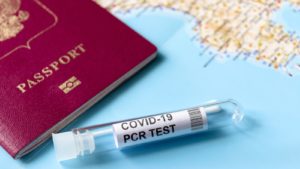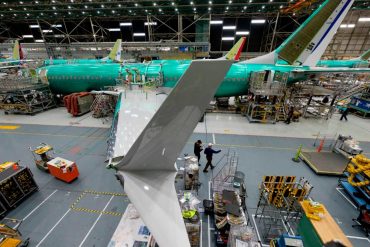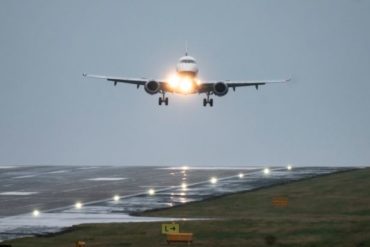COVID-19: Travel traffic light system scrapped – and changes to coronavirus tests for fully jabbed holidaymakers announced
A major relaxing of travel rules for people entering and leaving England has been announced for the coming weeks.
From 4 October, the current traffic light system of red, amber and green countries will be scrapped and replaced with one red list only, Transport Secretary Grant Shapps has said.
Anywhere not on the red list is considered green and clear for travel – there will no longer be an amber list.
Also from that date, passengers who are fully vaccinated will no longer need to take a pre-departure test for travelling into England from non-red list countries.
Then, from the end of October, people will be able to replace their day-two PCR test with a cheaper lateral flow test.
Anyone testing positive will need to isolate and take a free confirmatory PCR test which would be genomically sequenced to help identify new variants.
This means the new system, which is expected to stay in place at least until the New Year, should be in effect as people return from half-term breaks.
The government has also announced that from 4am on 22 September, eight destinations will be removed from the red list.
The destinations are:
• Turkey
• Pakistan
• The Maldives
• Egypt
• Sri Lanka
• Oman
• Bangladesh
• Kenya
The changes will apply to England only – with the Scottish government already announcing the country will not follow England in removing the requirement for people who are fully vaccinated to take a pre-departure test before returning from non-red list destinations.
In a statement, the Scottish government said: “A UK government decision to implement proposals to remove the requirement for a pre-departure test in England and to use lateral flow tests on day two have not been adopted at this stage in Scotland due to significant concerns at the impact on public health.”
Meanwhile, in a written statement, Eluned Morgan, minister for health and social services, said the Welsh government would “carefully consider” the simplified travel measures announced for England.
Those returning from red list countries will still need to spend 10 days in a government-approved quarantine hotel.
This will be the final regular traffic light review before the switch to the new two-tiered system, the government said.
Mr Shapps said: “Today’s changes mean a simpler, more straightforward system. One with less testing and lower costs, allowing more people to travel, see loved ones or conduct business around the world while providing a boost for the travel industry.
“Public health has always been at the heart of our international travel policy and with over 44 million people fully vaccinated in the UK, we are now able to introduce a proportionate updated structure that reflects the new landscape.”
Speaking to reporters later, the transport secretary said: “We wanted to bring a new, simpler, easier to navigate and cheaper system as well and so we have bought this in until the New Year at the very least and the purpose is to make it easier for people to travel without the bureaucracy, without so many tests and with a greater level of certainty – now that we have got so many people vaccinated.”
He said the change could not have been made sooner because the scientific advice did not favour it.
The regular three-weekly update of which destinations are designated green, amber and red had been due on Thursday but it was delayed by the Prime Minister Boris Johnson’s cabinet reshuffle.
Travel industry representatives have been welcoming the move which allows greater freedom for individuals to travel in the lead up to Christmas.
And Health Secretary Sajid Javid said: “Today we have simplified the travel rules to make them easier to understand and follow, opening up tourism and reducing the costs to go abroad.
“As global vaccination efforts continue to accelerate and more people gain protection from this dreadful disease, it is right that our rules and regulations keep pace.”
Shadow health minister Jim McMahon said Labour have been calling for a simplified system for international travel “for months”.
In a statement, he said: “PCR tests play a crucial role in identifying variants of concern and ministers must now set out in detail exactly how they will continue this surveillance – including whether they plan to increase sequencing of tests – to ensure we do not see a repeat of the failings that allowed the Delta variant to spread rapidly through the country.”
Mr McMahon added: “We all want to see international travel moving freely again, but the public deserve to hear in full how ministers intend to keep people safe and prevent any further variants that could risk the success of our vaccination programme.”
Transport Committee chairman and Conservative MP Huw Merriman said the changes are “welcome”.
“The committee has called out confusing watchlists and quarantines; criticised the delay in reaping the benefit of the vaccine dividend and puzzled over the high costs and lack of sequencing of PCR tests,” he said in a statement on behalf of the Commons committee.
“We note that using lateral flow tests may now incur a cost; it’s important that any alternative testing system is fairly priced and administered.
“The need for caution is clear but with 80% of our country now vaccinated, UK travel needs a shot in the arm and this could be it.
“It’s a relief to see the government move on these issues and this announcement, timed ahead of October half-term, could have an immediate impact on the UK’s travel industry.”
Meanwhile, Conservative MP Henry Smith, chairman of the All Party Parliamentary Group (APPG) for the Future of Aviation, added: “These announcements are good news for our aviation, travel and tourism businesses who have been the hardest and longest hit by the pandemic.”
Karen Dee, Airport Operators Association chief executive, said the easing of travel restrictions is “a good step forward” but that “this last formal checkpoint of the Global Travel Taskforce should have been the time to return to restriction-free travel at a time when nearly all of the population has been vaccinated”.
Ms Dee said the UK has “a more onerous approach to travel than our European competitors”, adding: “Ultimately, we need to return to a situation similar to prior to the pandemic, in which people can travel without further tests or forms to fill out. The UK and devolved governments should aim for this as soon as is safely possible.”
Johan Lundgren, chief executive of easy Jet, agreed the step is “welcome”, but added: “However, vaccinated travellers and those from low-risk countries will still have to do an unnecessary test after arriving in the UK, making travel less affordable for all.”
British Airways chief executive and chairman Sean Doyle also urged the government to go further and sweep away all testing requirements for fully vaccinated travelers.




